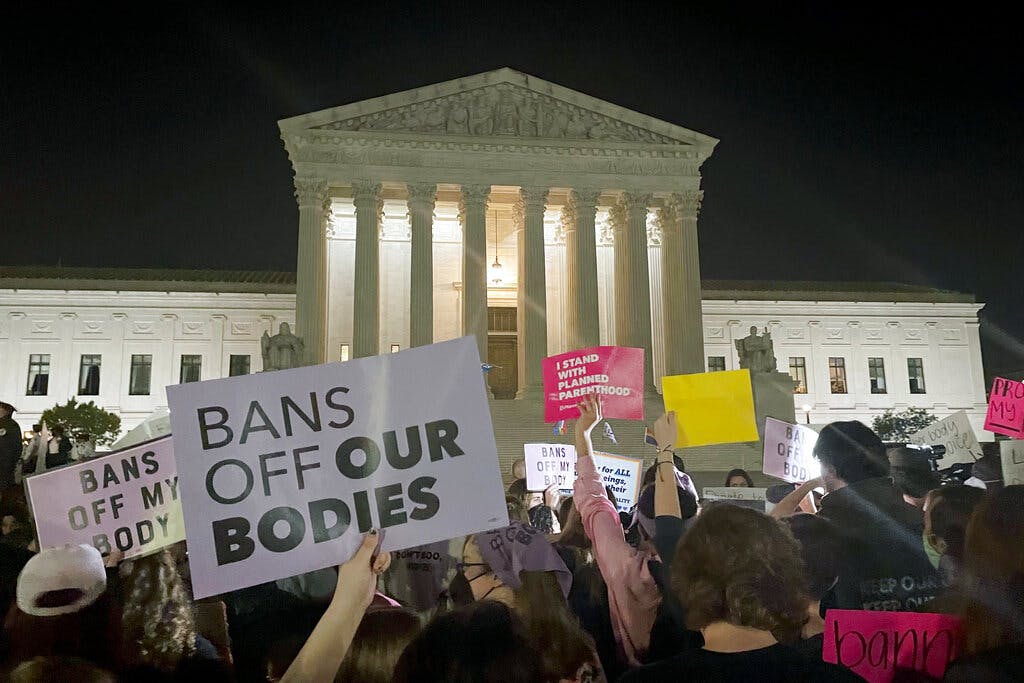Is Roe’s Demise Exaggerated?
Arguments that state constitutions provide abortion rights are being crafted faster than you can say ‘shadows and penumbra.’

Here’s a startling development in the battle over abortion. State court judges are starting, if only that, to find in their state constitutions the right to an abortion similar to what the Supreme Court concluded doesn’t exist in the federal constitution. This suggests that while the Supreme Court in Dobbs v. Jackson Women’s Health seeks to return the question of abortion to the “legislative process,” state courts might be loath to let it go.
No state constitution explicitly guarantees the right to an abortion. Yet arguments that such a right exists are being crafted faster than you can say “shadows and penumbra.” In Indiana, foes of an abortion ban cite “the fundamental rights of people seeking abortion care.” Florida’s Supreme Court is set to hear whether that state’s “right to privacy” protects abortion. In Michigan, a court of claims judge threw out a 1931 law that banned abortion.
One litigator, James Bopp Jr., calls what is happening constitutional “rewriting.” After Roe fell, Michigan’s anti-abortion law, passed in 1931, took effect again. It was promptly enjoined by a state judge, Elizabeth Gleicher, who this week scotched it altogether on the basis of the state constitution — even as the Michigan Supreme Court has greenlit a vote to add to the state constitution an amendment granting a specific right to abortion.
Why would a vote be needed after Judge Gleicher’s recent rulings? Her holding that due process delivers the right to an abortion stands in stark contrast to the Supreme Court’s refusal in Dobbs to read that right into the national parchment. She found Michigan’s 1931 law “facially unconstitutional because its enforcement would deprive pregnant women of their right to bodily integrity and autonomy, and the equal protection of the law.”
In a holding that reads like nothing so much as the penning of a belated dissent to Dobbs, Judge Gleicher opines that a law “denying safe, routine medical care not only denies women of their ability to control their bodies and their lives — it denies them of their dignity.” The allusion to Obergefell v. Hodges is hardly accidental. It is the kind of vaporous language and fuzzy thinking Dobbs explicitly rejects.
Judge Gleicher turns to the dean of the liberal legal commentariat, Professor Laurence Tribe, for the proposition that laws restricting abortion transform a woman into “an involuntary vessel entitled to no more respect than other forms of collectively owned property.” Litigating Roe all over again, she laments that abortion restrictions prevent a woman from determining the “shape of her present and future life.”
All this notwithstanding that in 1997, in the case of Mahaffey v. Attorney General, the Michigan Court of Appeals reversed a trial court decision to hold that “neither application of traditional rules of constitutional interpretation nor examination of [Michigan] Supreme Court precedent supports the conclusion that there is a right to abortion under the Michigan Constitution.” Judge Gleicher knows that ruling, because she argued the losing side.
The judge is more player than umpire on this score. She has been a donor to Planned Parenthood, who brought the suit she just decided. Her devotion is such that she “received the Planned Parenthood Advocate Award” in 1998. Even if she were a Solon, though, we would worry over what Justice Byron White warned of in his dissent to Roe — the impulse, always lurking, toward the “exercise of raw judicial power.”

